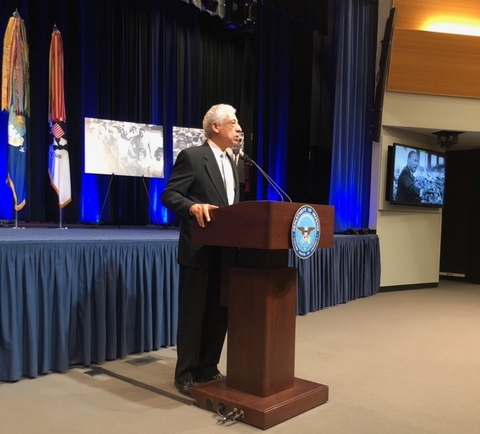
By Eagle Newswire
Former Tulsan, Bob Goodwin, keynoted the convocation honoring the life of Dr. Martin Luther King, Jr., today for the Department of Defense at the Pentagon. After remarks by the Acting Secretary of Defense, Patrick Shanahan, and the Director of Administration, Michael Rhodes, Goodwin used the occasion to focus on two ideas of resiliency and resolve. He told his audience of senior military and defense leaders, among the crowd that the core of Dr. King’s power and relevance was his belief all Americans have a common heritage and a common destiny. King’s most poignant and often repeated proclamation was that “we are inextricably bound”. Goodwin began his address by referencing his family’s experience of helping to rebuild his community after the massacre of 1921. He spoke eloquently about the community’s resiliency.
“So mine is a special reverence for the life and witness of Dr. King, and the resiliency and resolve he embodied because I, and my family, were, in our own small ways, partners in his campaign for human dignity and beneficiaries of his dream. Though my father started several other small businesses rooted in and supported by this historic community, and went on to law school at 50 years old, and in so doing, helping to integrate the University of Tulsa, the newspaper had a special mandate as a clarion voice for the voiceless,” stated Goodwin.
“The Oklahoma Eagle, in the tradition of Freedom’s Journal, The Chicago Defender, the Amsterdam News, became a part of the vital network of community organs that helped rekindle the conscience of the Nation, repudiating those actions present in all of our institutions that contradicted the American values of justice and equality,” says Goodwin.
He briefly described current efforts by the city to paint a better future for the entire city and used the “Still I Rise” poem of Maya Angelo to punctuate his point. He briefly traced King’s intellectual and philosophical foundation. “Dr. King was rooted in the teachings of Christian ethics. But he would have us know that there is a deeper implication within the social nature of ethics. He would instruct us that the moralist, or one who measures subjective reality against broad, universalistic standards, has a grave responsibility. Not only does he study the institutions and practices of society for what they do, he must tell them, perhaps in the spirit of the prophet, what they could be made to do.”
Goodwin went on to say, “Some like J. Edgar Hoover would have rather cast Dr. King in the mold of the seditionist, linked somehow sinisterly with the communist party or worse. But I beg to differ. Dr. King was a patriot and an optimist. He believed deeply in the promise of America. He knew that in America, we have the opportunity to declare to the world and for all ages that we—black men, white men, red men, brown men, Jew, Gentile, Muslim, Buddhist, Sheik and atheist—are inextricably bound. We must recognize that we are in a pact. “We will learn to live together as brothers or die together as fools,” he said.
“We must maintain an acknowledgment of and a commitment to nourish and support and sometimes act upon that those values that remind us of our common humanity and our common destiny and the efficacy of the golden rule.”
“Today,” Goodwin said, as Tulsa moves to appropriately commemorate the Centennial of the Tulsa race massacre, that city is struggling with the vestiges of that great communal horror, asking what can be done to ensure “never again”. So, as they plan and work, their history is being written day by day.”
Editors note: The full speech can be seen on YouTube or Bob Goodwin’s website: www.RKGoodwin.com.










